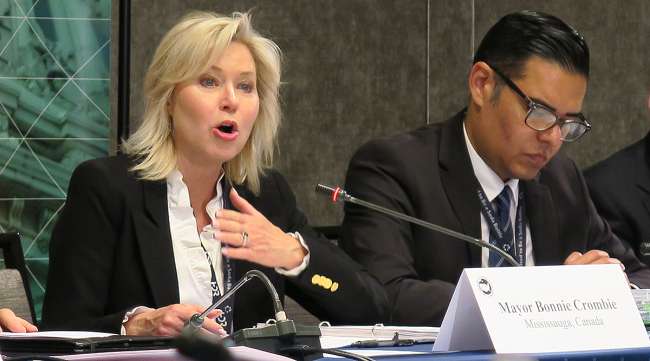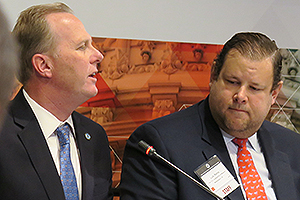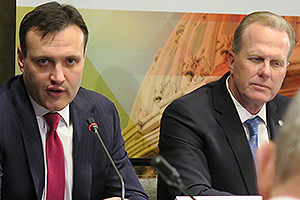Staff Reporter
Mayors, Ambassadors Discuss Advancing NAFTA Replacement Deal

WASHINGTON — Officials representing the United States, Canada and Mexico expressed support for advancing the treaty that is meant to serve as a replacement for the North American Free Trade Agreement.
The U.S.-Mexico-Canada Agreement was announced in late September as an update to NAFTA, which took effect in 1994. President Donald Trump, Canadian Prime Minister Justin Trudeau and outgoing Mexican President Enrique Pena Nieto signed an authorization for USMCA on Nov. 30 at the Group of 20 summit in Buenos Aires, Argentina. The deal still needs to be ratified by Congress.

Faulconer (left) by Eleanor Lamb/Transport Topics
San Diego Mayor Kevin Faulconer said the modernized agreement is important for maintaining ties between his city and its Mexican neighbor, Tijuana. Faulconer led a discussion among other mayors and ambassadors on trade at the U.S. Conference of Mayors’ winter meeting Jan. 23. He said his goal is to get Congress to sign USMCA into action.
“Free trade works. It’s incumbent upon us as mayors to talk about how important that is,” Faulconer said. “I’m looking forward to us as mayors to be leaders, to lean in on this conversation.”
Bonnie Crombie, mayor of Mississauga, Ontario, said more than 14 million jobs depend on free trade between Canada and the United States. Mississauga, a neighbor of Toronto, is one of the largest cities in Canada.
Crombie said the deal, which Canadians reconfigure to call CAMUS, is a strong agreement that was reached after tremendous efforts from negotiating parties. The countries had been renegotiating NAFTA since 2017 through a process that David MacNaughton, Canada’s ambassador to the United States, described as “physically and emotionally challenging.”
Crombie pointed out that Canada is the No. 1 customer of 36 states and that 20 million Canadians visit the United States annually, contributing to the nation’s tourism industry.
“These stats are as endless as they are enormous. But it’s more than just the numbers,” Crombie said. “We are better together.”
Martha Bárcena, Mexican ambassador to the United States, also supports USMCA. Although she said NAFTA brought benefits to Mexico, she recognized its unevenness and said that a new treaty was needed.

Mahoney (left) by Eleanor Lamb/Transport Topics
C.J. Mahoney, deputy United States Trade Representative for investment, services, labor, environment, Africa, China and the Western Hemisphere, praised the agreement as a much-needed update to the “relic” that was NAFTA. In particular, he lauded the deal’s limits on tariffs and measures to protect labor organizers and wildlife.
Mahoney, who was confirmed in March 2018, said the White House fully backs USMCA. He called on the mayors gathered before him to urge their congressional representatives to support the agreement.
“If members of Congress can put politics aside and focus on the substance, I have no doubt this will pass overwhelmingly in both houses,” Mahoney said. “Across the board, USMCA is better for workers, farmers, ranchers [and] businesses small and large than NAFTA or any other trade agreement that the U.S. has negotiated.”
Mahoney said he hopes USMCA will create a standard for trade with the rest of the world, an idea that MacNaughton echoed.
“This is a significant improvement over the previous deal,” MacNaughton said. “It is also a model that the rest of the world can look at and that we can use as we try to expand trade and opportunity for citizens in all three of our countries.”

